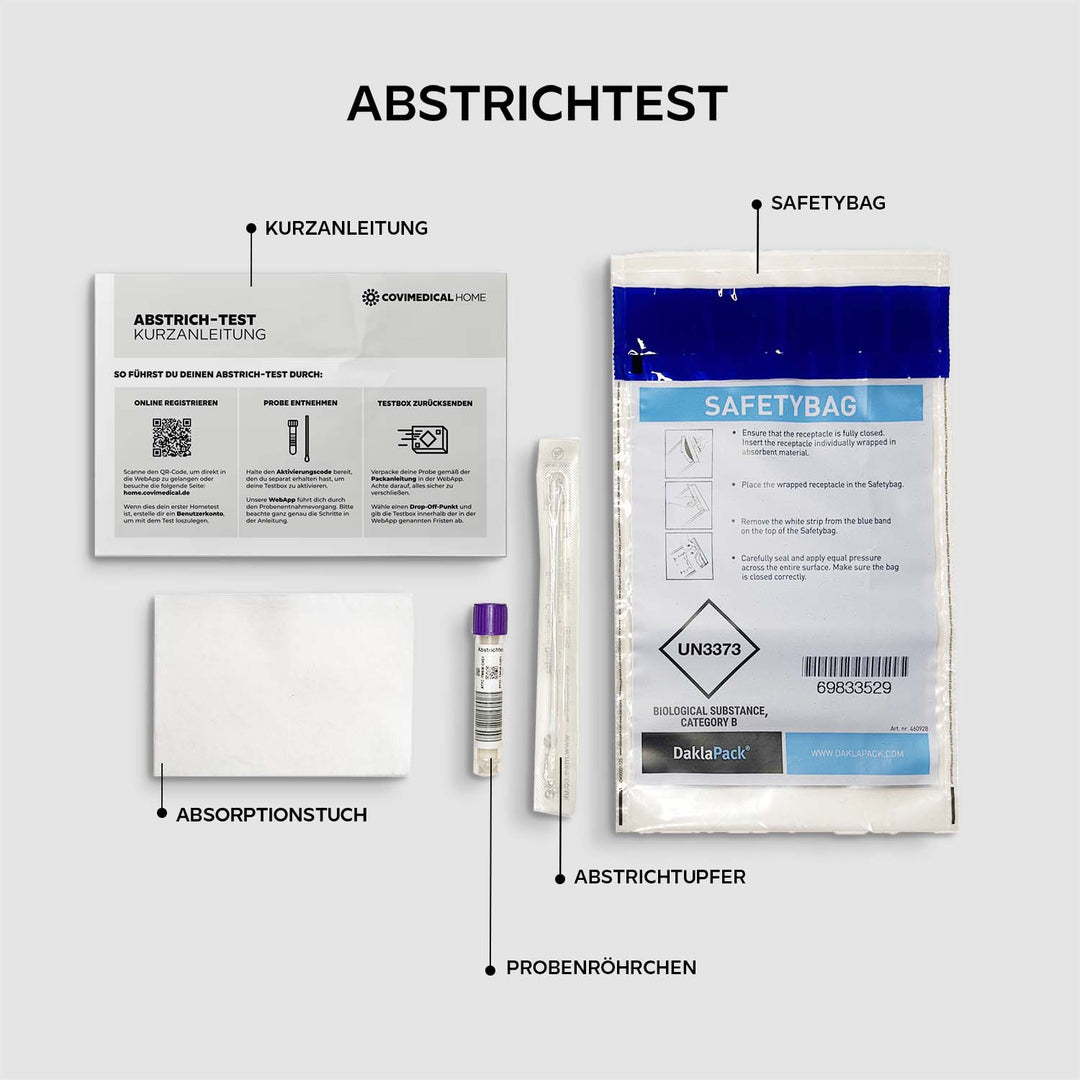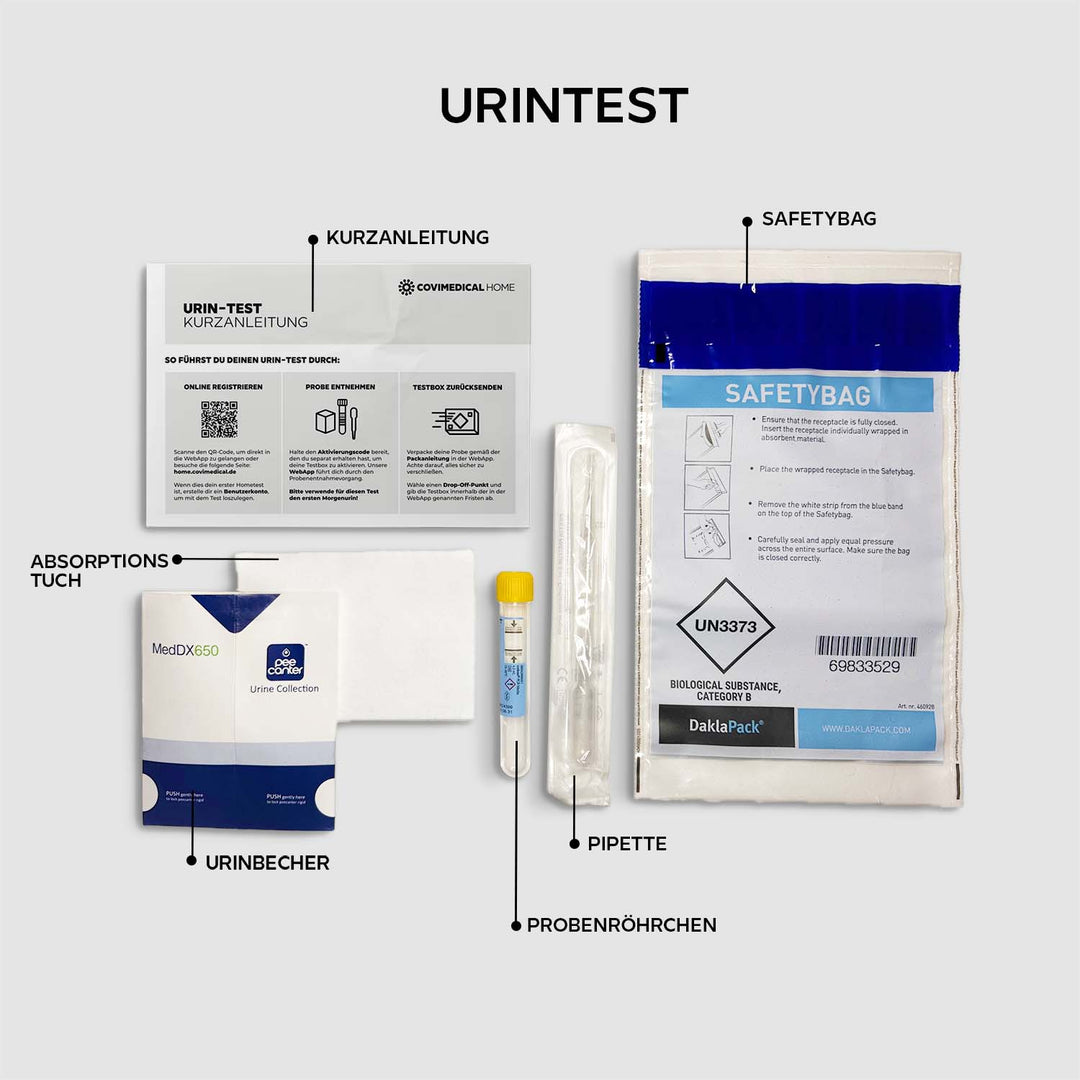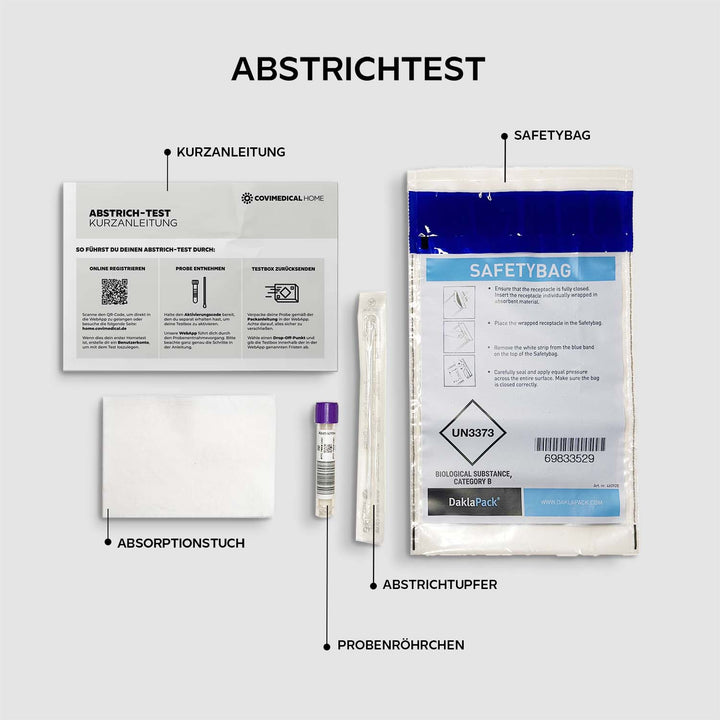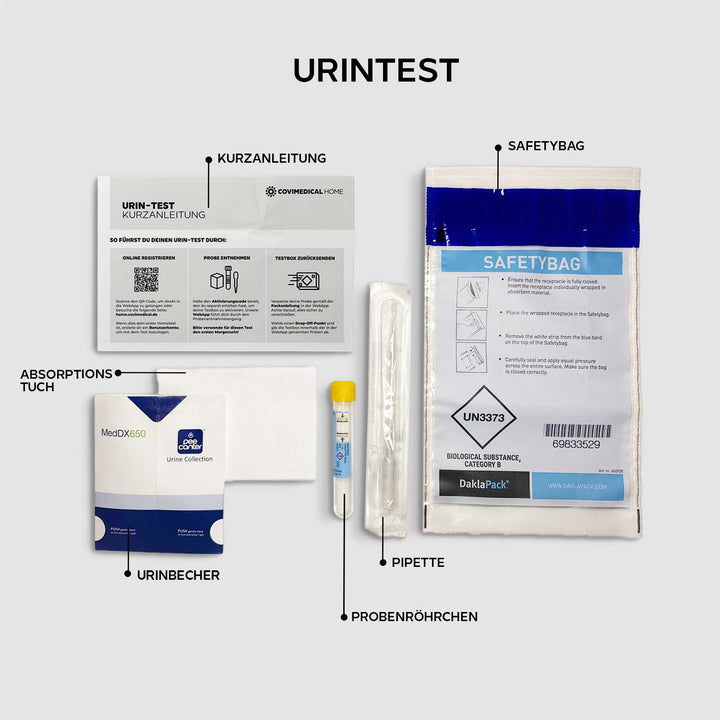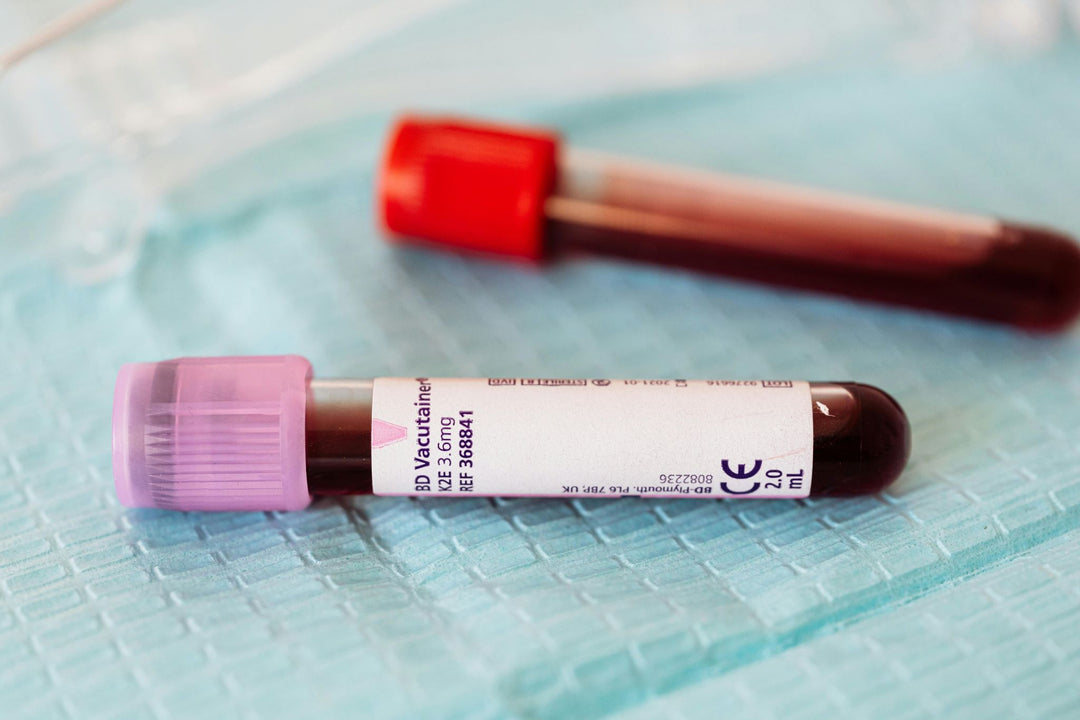With this test, your sample is examined for 7 different STI pathogens:
Chlamydia
What are Chlamydia?
- Chlamydia are bacteria that can be sexually transmitted and are among the most common sexually transmitted infections. They affect both men and women and can lead to various health problems if not treated in a timely manner.
How are Chlamydia transmitted?
- Chlamydia is mainly transmitted through unprotected sexual intercourse (vaginal, anal, or oral) with an infected person. The infection can also be transmitted from an infected mother to her newborn during childbirth.
What symptoms do Chlamydia cause?
- It's important to note that Chlamydia often progress asymptomatically, and individuals may show no obvious signs of infection. However, the following symptoms may occur:
In Men:
- Discharge from the urethra
- Swelling or pain in the testicular area (rare)
- Burning or pain during urination
In Women:
- Pain during urination
- Vaginal discharge (unusual amount, color, or odor)
- Spotting or abnormal menstruation
- Lower abdominal pain or pressure
What complications can occur if Chlamydia is untreated?
- Untreated Chlamydia infections can have serious consequences, including:
In Men:
- Inflammation of the epididymis and prostate, as well as an increased likelihood of infertility.
In Women:
- Pelvic inflammatory diseases that can lead to infertility
- Ectopic pregnancies
- Chronic pain in the pelvic area
How are Chlamydia diagnosed?
- To diagnose Chlamydia, a urine test or a swab from the urethra in men or the cervix in women is usually performed. Tests can also be applied to other bodily fluids, such as discharge from the genital organs.
How are Chlamydia treated?
- Chlamydia can generally be effectively treated with antibiotics. It is crucial to complete the treatment as prescribed by the doctor to successfully combat the infection.
How can one protect oneself from Chlamydia?
- The best method to protect oneself from Chlamydia is using condoms or dental dams during sexual intercourse. A monogamous relationship with an uninfected partner can also reduce the risk of transmission. Regular STI tests and informing sexual partners of infections are also important preventive measures.
Can Chlamydia be transmitted even if no symptoms are present?
- Yes, Chlamydia can be transmitted without visible symptoms. Many people with a Chlamydia infection show no signs, so it is possible for the bacteria to be transmitted from an infected person to an uninfected partner during unprotected sexual intercourse, even if no symptoms are apparent.
Can the treatment of Chlamydia lead to complications?
- Generally, the treatment of Chlamydia with antibiotics is safe and effective. However, some people may have allergic reactions or side effects to specific antibiotics. It is important to inform the doctor of all existing health problems and medications so that the appropriate treatment can be prescribed.
Are Chlamydia exclusively a sexually transmitted infection?
- While Chlamydia is primarily transmitted through sexual contact, it can also spread in other ways. For example, newborns can be infected during childbirth from an infected mother. However, it's crucial to emphasize that sexual contact is the most common mode of Chlamydia transmission.
- Note: If you suspect that you or your partner may have Chlamydia, please seek prompt medical attention for proper diagnosis and treatment.
Gonorrhea
What is Neisseria gonorrhoeae?
- Neisseria gonorrhoeae is a type of bacteria that causes the sexually transmitted infection gonorrhea, also known as "Clap." It is one of the most common sexually transmitted pathogens worldwide.
How is Neisseria gonorrhoeae transmitted?
- Neisseria gonorrhoeae is primarily transmitted through unprotected vaginal, anal, or oral sexual intercourse with an infected person. The bacteria can also be transmitted from an infected mother to her newborn during childbirth.
What symptoms does Neisseria gonorrhoeae cause?
- In Women: Symptoms of Neisseria gonorrhoeae can be easily overlooked or may cause no complaints at all.
- In Men: Symptoms may include a burning sensation during urination, discharge from the urethra, swelling, and pain in the genital area.
Which other parts of the body can be affected by Neisseria gonorrhoeae?
- Neisseria gonorrhoeae can infect not only the genitals but also the throat and anus. Infections in the throat may be asymptomatic, while anal infections can cause discomfort such as itching, discharge, and pain.
How long does it take for symptoms to appear after an infection?
- The incubation period, i.e., the time from infection to the onset of initial symptoms, is usually 2 to 7 days but can extend up to 30 days.
What complications can occur with untreated Gonorrhea?
- Untreated Gonorrhea can lead to severe complications, including infertility in both women and men, pelvic inflammatory diseases, ectopic pregnancies, and, in the case of infection during childbirth, serious eye infections in babies.
How is an infection with Neisseria gonorrhoeae diagnosed?
- Diagnosis is made through a swab or a urine sample to detect the presence of the bacteria. If there is suspicion of infection in the throat or anus, a swab can be taken from these areas.
Is Neisseria gonorrhoeae treatable?
- Yes, Neisseria gonorrhoeae infections can usually be treated with antibiotics. However, it is crucial to start treatment promptly to avoid complications and curb the spread of the infection.
What protective measures are there against Neisseria gonorrhoeae?
- The best protection is practicing safer sex, meaning using condoms or dental dams for oral stimulation. A monogamous relationship with an uninfected partner can also reduce the risk.
Can one become infected with Neisseria gonorrhoeae multiple times?
- Yes, it is possible to become infected with Neisseria gonorrhoeae multiple times, especially if no protective measures are taken, and the partner is infected.
Mycoplasma Genitalium and Mycoplasma Hominis
What is Mycoplasma genitalium?
- Mycoplasma genitalium is a type of bacteria that is sexually transmitted, causing infections in the genital area.
What symptoms does a Mycoplasma genitalium infection cause?
- In men, symptoms may include a burning sensation during urination, discharge from the urethra, and mild inflammation of the urethra. In women, symptoms can manifest as vaginal inflammation, pain during intercourse, vaginal discharge, and abdominal pain.
How is a Mycoplasma genitalium infection diagnosed?
- The infection is detected through a swab or a urine sample, which is then tested for the presence of Mycoplasma genitalium.
What are the risk factors for a Mycoplasma genitalium infection?
- Risk factors include unprotected sexual intercourse with an infected partner and having multiple sexual partners.
How is a Mycoplasma genitalium infection treated?
- The infection can be treated with antibiotics.
What is Mycoplasma hominis?
- Mycoplasma hominis is another type of bacteria that naturally occurs in the genital tract and can be sexually transmitted.
What symptoms does a Mycoplasma hominis infection cause?
- In women, Mycoplasma hominis infections can cause vaginal inflammation, pain during intercourse, vaginal discharge, and abdominal pain. In men, symptoms are often mild or absent.
How is a Mycoplasma hominis infection diagnosed?
- An infection with Mycoplasma hominis is also diagnosed through a swab or a urine sample.
What factors increase the risk of a Mycoplasma hominis infection?
- Risk factors also include unprotected sexual intercourse with an infected partner and having multiple sexual partners.
How is a Mycoplasma hominis infection treated?
- Treatment usually involves antibiotics.
What are possible complications of untreated Mycoplasma genitalium and Mycoplasma hominis infections?
- Untreated infections can lead to more severe inflammation in the genital area, increasing the risk of complications such as infertility and ectopic pregnancies.
Can Mycoplasma genitalium and Mycoplasma hominis occur together?
- Yes, it is possible for both types of bacteria to coexist in the genital tract.
How can one prevent a Mycoplasma infection?
- Practicing safe sexual activities by using condoms can reduce the risk of infection.
Is a Mycoplasma infection curable?
- Yes, with timely diagnosis and appropriate treatment, Mycoplasma infections are usually curable.
Ureaplasma Urealyticum and Ureaplasma Parvum
What are Ureaplasma Urealyticum and Ureaplasma Parvum?
- Ureaplasma Urealyticum and Ureaplasma Parvum are types of bacteria that naturally inhabit the human urogenital tract.
What symptoms can be caused by Ureaplasma Urealyticum and Ureaplasma Parvum?
- Symptoms can vary, but the most common ones include urethritis, pain during urination, vaginitis, and unusual discharge.
How are Ureaplasma infections transmitted?
- Ureaplasma infections are primarily transmitted through sexual contact, but they can also be passed from mother to newborn during childbirth.
What factors can increase the risk of a Ureaplasma infection?
- A weakened immune system, frequent changes in sexual partners, and unprotected sexual intercourse can elevate the risk of infection.
What symptoms can men have with a Ureaplasma infection?
- Men may experience symptoms such as burning during urination, discharge from the urethra, and genital pain.
What symptoms can women have with a Ureaplasma infection?
- Women may exhibit symptoms like vaginal pain, itching, burning during urination, and abnormal vaginal discharge.
Can Ureaplasma infections also be asymptomatic?
- Yes, many people can have a Ureaplasma infection without noticing symptoms. This is referred to as asymptomatic infection.
How is a Ureaplasma infection diagnosed?
- Diagnosis usually involves a urine test or swab to detect the presence of bacteria.
What complications can be caused by Ureaplasma infections?
- Ureaplasma infections can lead to inflammation of the reproductive organs and increase the risk of preterm births in pregnant women.
How are Ureaplasma infections treated?
- Ureaplasma infections can typically be treated with antibiotics prescribed by a doctor.
Is it possible to prevent a Ureaplasma infection?
- Practicing safer sex, such as using condoms, can reduce the risk of a Ureaplasma infection.
Should both partners be treated if one has a Ureaplasma infection?
- Yes, it is recommended that both partners be treated simultaneously to prevent retransmission.
How long does it usually take for a Ureaplasma infection to resolve?
- Most infections clear up within one to two weeks with proper antibiotic treatment.
Can Ureaplasma infections become chronic?
- Yes, in some cases, Ureaplasma infections can become chronic and recur.
Syphilis
What is Syphilis?
- Syphilis is a sexually transmitted infection (STI) caused by the bacterium Treponema pallidum. It can affect various organs and tissues in the body and can be severe if left untreated.
How is Syphilis transmitted?
- Syphilis is mainly transmitted through unprotected sexual contact with an infected person, including vaginal, anal, or oral sex. The infection can also be passed from a pregnant woman to her unborn child.
What are the symptoms of Syphilis?
Syphilis symptoms develop in three main stages:
- Primary Stage: A painless sore (chancre) appears at the site of bacterial entry, such as the penis, vagina, anus, or mouth.
- Secondary Stage: Skin rashes, fever, fatigue, and swollen lymph nodes may occur.
- Tertiary Stage: If the infection remains untreated, it can lead to severe damage to internal organs, the nervous system, and other body parts.
How long does it take for symptoms to appear?
- The incubation period, the time between infection and the onset of symptoms, is usually 3 to 4 weeks but can last up to 3 months.
How is Syphilis diagnosed?
- Syphilis is diagnosed through a blood test detecting antibodies against Treponema pallidum. Additional tests on fluids from the sores in the primary stage may be necessary.
Is Syphilis curable?
- Yes, Syphilis can be successfully treated with antibiotics, especially in the early stages. Treatment typically involves the use of penicillin or other suitable antibiotics, depending on allergies or other factors.
What happens if Syphilis is left untreated?
- If left untreated, Syphilis can lead to serious complications such as cardiovascular issues, neurological disorders, vision problems, numbness, mental disorders, or even death.
How can one prevent a Syphilis infection?
- The best way to prevent a Syphilis infection is practicing safer sex, including the use of condoms during sexual intercourse. Regular testing for sexually transmitted infections is advisable, especially with multiple sexual partners.
Is Syphilis only transmitted through sexual contact?
- Syphilis is primarily transmitted through sexual contact, but in rare cases, it can also be transmitted through direct skin contact with the sores of an infected person or from a pregnant woman to her unborn child.
Can one get infected with Syphilis without symptoms?
- Yes, it is possible for a person with Syphilis to have no obvious symptoms and still get infected. This form of Syphilis is referred to as "silent" or "asymptomatic" Syphilis. Regular testing for sexually transmitted infections is crucial for early detection and treatment.











